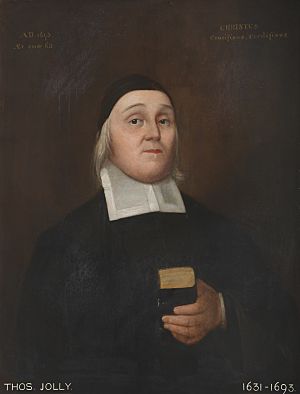Thomas Jollie facts for kids
Thomas Jollie (1629–1703) was an English minister who believed in different ways of worship than the official Church of England. Because of his beliefs, he was removed from his church. People like him were called English Dissenters because they "dissented" or disagreed with the main church.
Contents
Thomas Jollie's Life Story
Thomas Jollie was born in a place called Droylsden, near Manchester, on September 14, 1629. His father, Major James Jollie, was an important military leader for Oliver Cromwell in Lancashire. Thomas went to Trinity College, Cambridge, in 1645. There, he became good friends with another minister named Oliver Heywood.
Starting His Ministry
In September 1649, Thomas Jollie became a minister in Altham, Lancashire. Even though there was some opposition, he created a "gathered church" there. This meant that people chose to join his church because they shared his beliefs, rather than just going to the church closest to their home.
His church had very strict rules. For example, in 1655, a woman named Jennet was removed from the church. This happened because she promised to marry a Catholic man, which the church did not approve of.
Facing Arrests and Challenges
Thomas Jollie often faced trouble because he did not use the official prayer book of the Church of England. After the king returned to power in England (this was called the English Restoration), Jollie was arrested. He was released after he promised loyalty to the king.
However, his troubles continued. He was arrested again and people tried to stop him from preaching. He was called to the bishop's court and was told he could not preach anymore. This happened just before a new law, the Act of Uniformity 1662, came into effect in August 1662. This law made it very difficult for ministers like Jollie to continue their work, so he had to leave his church.
After this, Jollie moved to Healey, in Burnley. In 1663, he was arrested again for holding a "conventicle." This was a secret meeting for religious worship that was not allowed by law. He was put in prison in Skipton and later in York Castle. In 1664, he was jailed for eleven weeks in Lancaster Castle. He was arrested again in 1665.
In 1667, he bought a farmhouse called Wymondhouses near Clitheroe. He continued to preach there. In 1669, he was sent to prison in Preston for six months for preaching near Altham.
When the king allowed more religious freedom in 1672 (this was called the Declaration of Indulgence), Jollie got licenses for four places to preach. He even had a clever staircase at his home in Wymondhouses to help him avoid arrest when he was preaching there. Still, he was fined £20 in 1674 for preaching in Slaidburn.
When the Glorious Revolution happened in 1688, bringing more religious freedom, Jollie built a meeting-house next to his home. He also opened other places for worship nearby.
The Case of Richard Dugdale
In 1689, Thomas Jollie became involved in the case of Richard Dugdale. Some people believed Dugdale was possessed by a demon. Jollie thought it was a real possession, like those mentioned in the Bible. He and more than twelve other ministers tried to help Dugdale through prayer and fasting.
Jollie believed that Dugdale got better because of the prayers of the nonconformist ministers. However, some people, like Zachary Taylor, a vicar, disagreed. They wrote about it, saying it was not real.
Working Together for Peace
Even though Thomas Jollie had strong beliefs, he joined a group called the "happy union." This group brought together different types of Protestant Christians, like Presbyterians and Congregationalists, to work together. This union started in Lancashire in 1693. Jollie helped lead the discussions and even preached a sermon for the group. He also wrote a long essay about how different churches could get along better.
Later Life and Family
Thomas Jollie passed away at Wymondhouses on March 14, 1703. He was buried in Altham. He had two sons, Timothy and Samuel. A painting of Thomas Jollie is kept at Mansfield College, Oxford, which was the first college at Oxford University for nonconformist students.
Images for kids
 | Isaac Myers |
 | D. Hamilton Jackson |
 | A. Philip Randolph |



